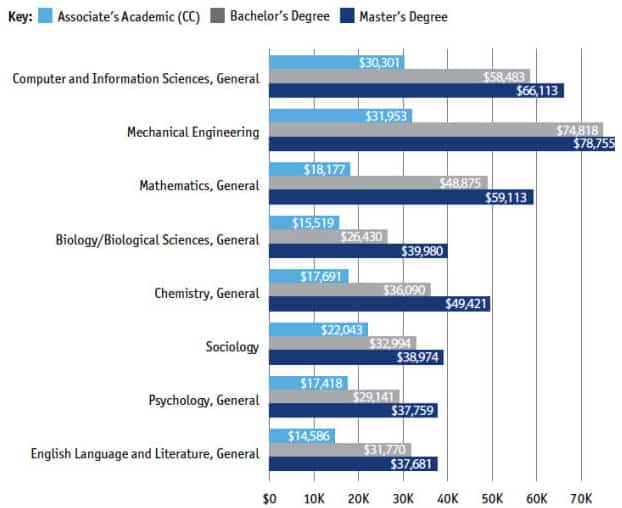
I’m sure a lot of you out there are relieved if your children intend to major in a STEM (science, technology, engineering, math) field, which represent just six percent of the current American workforce.
STEM majors find the job market much easier because too few Americans are receiving degrees in these difficult disciplines. And STEM majors make more money than the rest of us.
What I just said is the conventional wisdom, but what if I told you that the STEM advantage could be a myth?
Many experts are suggesting that the STEM employment advantage just doesn’t hold up to close scrutiny. And this is supremely ironic considering that politicians are badgering colleges and universities to offer more STEM majors and to ditch those “worthless” liberal arts offerings. Some politicians are 
This week The Chronicle of Higher Education wrote an exhaustive article on the subject in which the author interviewed experts across the country and shared research on whether STEM majors enjoy an employment advantage. According to the article, most independent researcher say the answer is no.
In another piece that I wrote for CBS MoneyWatch (you’ll learn more about it below), the STEM salary advantage is also questioned. The post suggests that Americans who major in a “TEM” major are the ones most likely to enjoy a salary advantage, not science majors.
If there really was a STEM labor shortage, experts told The Chronicle, we’d be witnessing an overall rise in wages in the technology and science fields and that is not happening. Thanks to the fracking boom, petroleum engineers are indeed enjoying rising salaries, as are some information technology workers, but most in the STEM fields aren’t, according to The Chronicle piece:
The article notes that corporations, including Microsoft, have advocated for more federal dollars for STEM education and more visas for foreign IT workers even as they lay off thousands of Americans with comparable skills. Here is where you can read the entire article:
The STEM Crisis: Reality or Myth?
A STEM Salary Advantage?
A piece that I wrote for my college blog at CBS MoneyWatch last month supports the dour article in The Chronicle.
In the piece I mention a new, eye-opening study by College Measures, which is a nonprofit that helps state governments disseminate real salary data on new college graduates. The study used actual first-year salary data on new college graduates provided from state employment databases in Colorado, Texas and Virginia.
The research of these actual salaries revealed that at least in these three states, the students majoring in the sciences, typically didn’t earn salaries that were any higher than those majoring in subjects like sociology and English literature.
Here is a chart of salaries for young grads in Texas that illustrates the study’s conclusions:
To learn more, here is my post:
Not All STEM Majors Go On To Make Big Bucks



I know this is an old post, but its 100% garbage. STEM and IT will *maybe* get you a middle income job in a high/medium cost of living area (where most of the jobs are). That amounts to you just being another blue collar cog in the wheel in what was supposed to be some high paying white collar job. Outsourcing and the intense entry/mid level competition driven by the “everyone can code” and “everyone needs to get into IT” make it a VERY difficult career path to obtain and keep up with, for very little reward. Why spend 60 hours a week at work, then another 10-15 a week studying or playing around in a lab for a mid-level salary? Unless you are in the top 10%, its really not worth it. My advice, become a plumber like I did. I make WAY more money, don’t answer to a boss (except myself) and I am in WAY better shape that 90% of the IT desk jockeys. Before you dismiss my comment, I was doing AWS/Devops work and STILL left the industry. Not worth the hassle.
Well I can say this..I feel the research here is either bias or uninformed or both..granted I think regardless of what your major is…your chosen industry to exploit that major makes a difference..But I have a BA in industrial engineer with numerous professional certifications that allow me to work heavily in the energy sector..conventional/nuclear power and chemical. Unlike the majority of job finders where there is one job per every 5 or 10 applicants..in my field there is 5 jobs for every one applicant..I have had to turn down recruiters monthly..sometimes weekly and then they offer me thousands of dollars IF I can find them someone who can fit the job…I am not exaggerating!! My motto is this…there is only so much paper a group of people can push around before someone has to build something. I vote for being a technical part of building things…I literally can write my one economic ticket in my world. I definitely advocate enjoying the arts but work in the sciences.
Actually going into the College Measures report itself, it supports STEM being higher paid than average, with the exception of biology.
Looking at the highest pay band in the chart above, (master’s degree) for the non-STEM fields (soc, psych, lit) are basically in the upper $30K range. Indeed, the Texas report places all three of these master’s degree salaries below the state average for all bachelors degrees. The STEM fields are all more than this, with the possible exception of bio. And the “hard” disciplines such as ME are essentially double the liberal arts degrees. The reports indicates the liberal arts based educations that have the best pay lead to business related degrees.
I will very much agree that people should pick STEM because they fit. This field is hard. Not just in terms of the coursework, but in the workforce. Expectations on productivity are high with long hours and on going continuous education. It’s not the field for everyone.
Yes, there are way more jobs to be had working in fast food joints. Why waste time on a mythical STEM career? Besides, most of the salaries aren’t increasing in those careers. Well, maybe because a STEM career starts higher than a fast food job. Who cares if you only make 50 or 60K and the salary doesn’t increase? Its a lot better than the hard to find low paying jobs from a liberal arts degree. Maybe a study of percentage of liberal arts majors versus STEM majors currently working at McDonalds would reveal something.
Hi Kerry,
Only six percent of the workforce can be traced to STEM jobs. I think it’s foolish to dismiss liberal arts majors as dead ends.
Lynn O’Shaughnessy
I think it is foolish to depict STEM advantages as a myth, especially based on the chart which only lists a small set of stem majors resulting from such a degree. Looks like cherry picking and even then shows three of the majors as looking pretty good. It makes the article look biased. Certainly students not up to the rigors of STEM should not be lured into it because they think it will get them a higher paying career. But for those who are able and even like STEM, I think the chances of being rewarded are high.
How would you meld this opinion from The Chronicle with this 2013 Wall Street Journal article that shows the top 9 salaries in 2013 being STEM (most engineering) and #10 is a Wall Street job.
These are jobs with just a bachelor’s degree, I note.
I live in Houston now which is loaded with engineers. The oil and gas industry is going to have a big empty hole and not enough people to fill the jobs as those in their late 50s and early 60s right now start to retire. The industry is quite worried, from what I have read in local newspapers. They need more engineers now to train so they will be ready and independent as the others retire.
http://online.wsj.com/news/articles/SB10001424127887323982704578453000319219668
Christine – The exception in pay is petroleum engineers largely because of the fracking boom. It’s an industry myth that there aren’t enough engineers. And yes engineering is the top paying jobs, but it only pays well for those that can even find jobs in this field.
Lynn O’Shaughnessy
I’m five years removed from Texas A&M. The Bachelor’s degree average for a Biology major seems incredibly low to me. High Schools across the state were clamoring for physical science majors and were paying a considerable premium to teach high school science. The average teacher’s salary in Texas is $38,000 so you would think science majors would earn at least that.
Do these average include Graduate Student salaries or lab technicians researching for higher degrees?
Lauren,
These are actual salaries as opposed to surveys of salaries. They do not include students who graduated from Texas schools and then left the state to work elsewhere.
Lynn O’Shaughnessy
Great article!
No matter the field one enters, there is more room at the top of the ladder of success than at the bottom.
In other words, Correlation is not Causation
Think about the top 20% of a given occupation. Do you have what it takes to be there? If so, earnings will be reflective of this.
Excellence takes many forms. Find a way to accentuate strengths to maximize earnings, while learning a breadth of knowledge to better relate to experts in other fields.
STEM is the right course for the right person, and the wrong course for the wrong person, just as a hammer is better for nails than for slicing bread.
I totally agree with you Ken. I hope this STEM reality helps students pick STEM majors for the right reasons and not because they are being pressured.
Lynn O’Shaughnessy